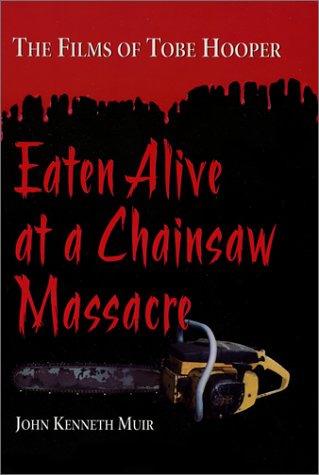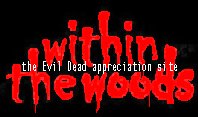
|
Title:
Eaten Alive at a Chainsaw Massacre: The films of Tobe Hooper
Author: John
Kenneth Muir
Price: RRP 32.00
GBP (Book Rare and Availability Scarce)
This book
looks at each of Hooper’s movies from the original TCM
up to the lamentable effort CROCODILE in the year 2000. The
book kicks off with a well-written and curt introduction glossing
over the production history and origins of each film while
discussing Hooper’s influences as a child; his up-bringing
living in a cinema and his fascination with EC comics. Each
film is given it’s own section and are made up of the
following; A short series of quotes/extracts from reviews
of the time, list of cast and crew, a summary of the story
and the commentary.The
‘commentary’ sections are what Muir is all about.
As expected of a college graduate in film he really scrapes
deep beneath the surface of the film and looks for the subtext;
every nuance is analysed. It makes for fantastic reading for
the film enthusiast but if there’s one criticism then
it’s at times you have to remind yourself it’s
a book your reading and not a college thesis. |
| When
it comes to the movies it seems like the most time is spent
on Hooper’s TCM movies. However, each film is given
the same dedicated approach and is thoroughly dissected. There’s
far too much detail to go into here but suffice it to say
you’ll enjoy reading it even if you don’t agree
with it. Even truly appalling films like THE MANGLER and CROCODILE
and the underrated LIFEFORCE and THE FUNHOUSE get the same
fantastic attention. It even made my re-assess his TCM follow-up,
EATEN ALIVE. My two favourite allegories though are his comparison
of TCM to Alice in Wonderland and Poltergeist as an attack
on president Ronald Reagan’s lassez-faire domestic policies.
Engrossing stuff.
Because Hooper
not only works within the realm of film there are sections
showcasing his work on the small screen. His biggest TV success
to date, the Stephen King adaptation SALEM LOT, gets the biggest
analysis. It’s fascinating to read the parallels and
themes that Muir finds in this. Check it out to believe it!
He then covers contributions to Spielberg’s Amazing
Stories, Tales From the Crypt and nineties fare such as Nowhere
Man and Dark Skies. Each makes great reading as it gives you
a chance to see his work outside of the horror genre, examining
his work as a storyteller.
To round off the
book, amidst the usual Appendices (of which there are a canny
few!) there’s a nice section which looks at reoccurring
themes in his work. It’s a great little section to finish
the book on, it’s just a list of films under the categories
such as ‘False Sanctuary’, ‘ Partners in
crime, reflections in Evil’, ‘The World Underneath’
to name but a few.
Should
you buy this book? If you are a fan of Hooper,
a film analyst or want to re-examine his work then this book
is essential. It drips with a care and attention that would
put some authors of similar material to shame. Muir’s
passion for the genre, and his appreciation for Hooper, are
infectious. The thing I’d say might cause a complaint,
and this applies to all Muir’s books, would be the sometimes
over-analytical style that can feel too heavy. That aside
this is a riveting analysis of an underrated film-maker whose
latest comeback movie, 70s ‘slasher’ flick remake
THE TOOLBOX MURDERS, is pulling in great reviews and doing
good business.

4 out of 5 chainsaws!!!
 -- | Amazon.co.uk|
-- | Amazon.co.uk|
|

